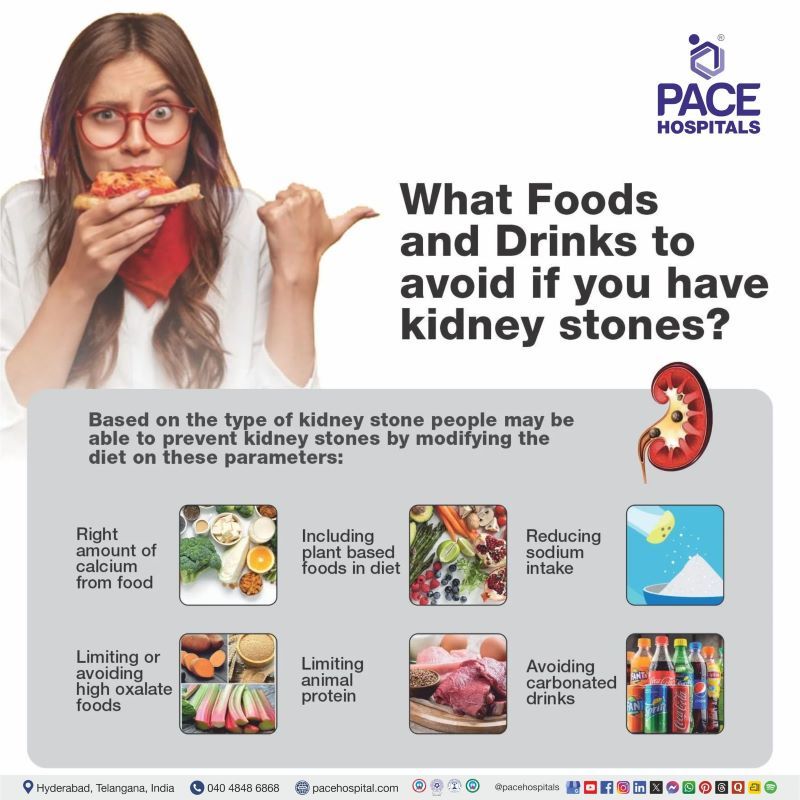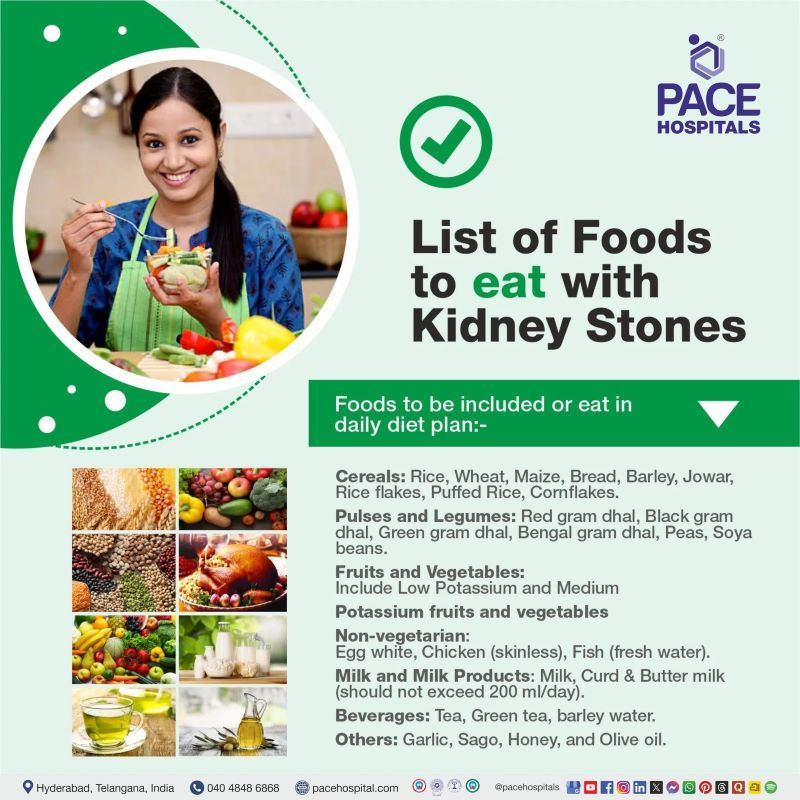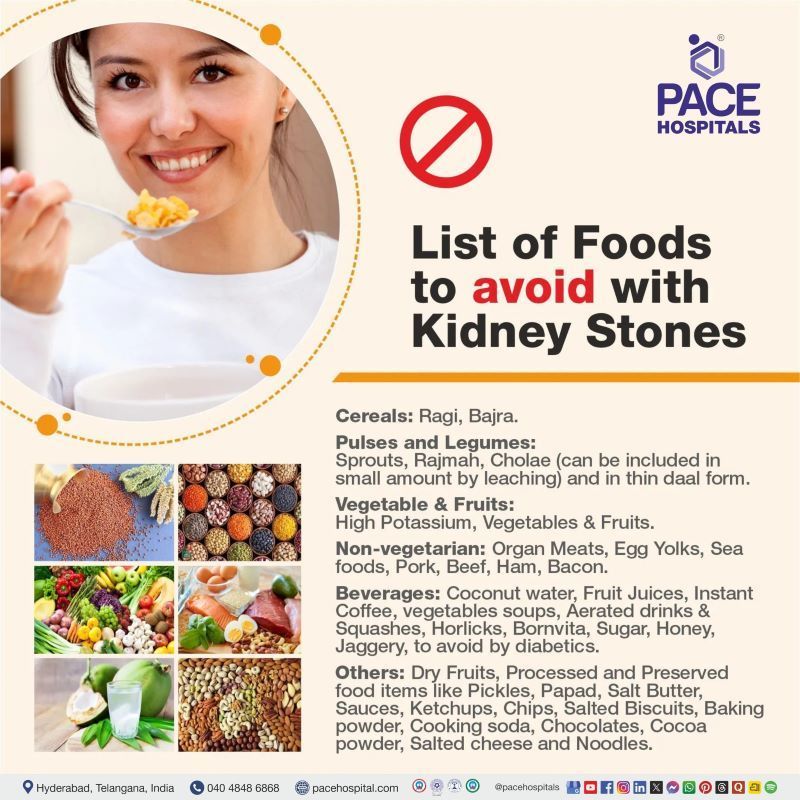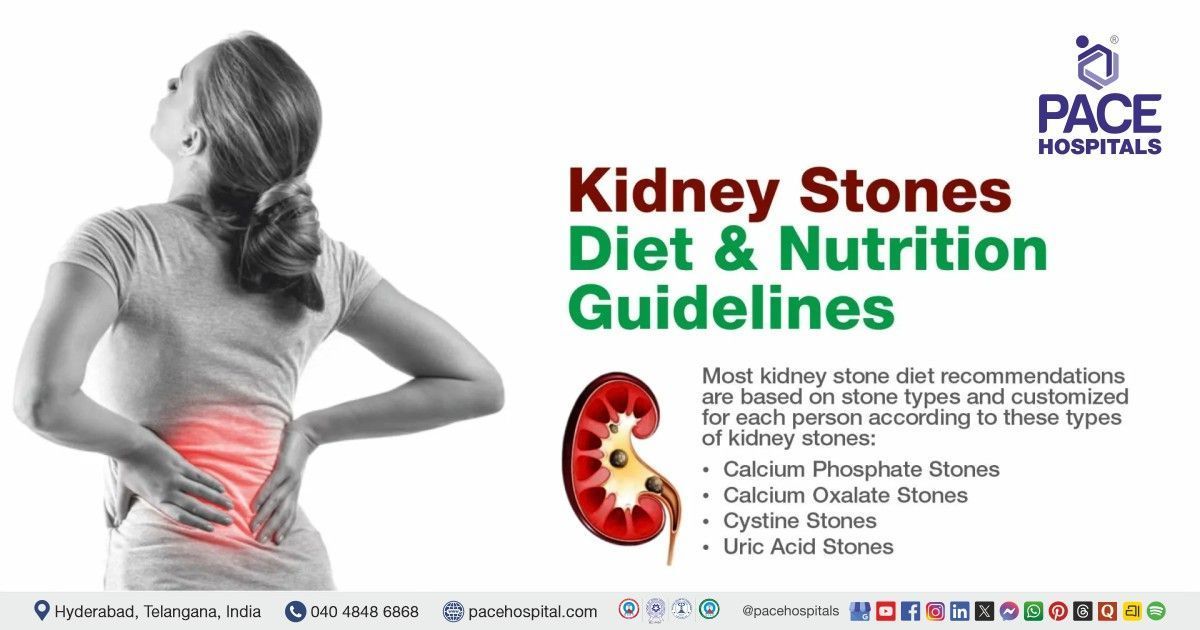Kidney Stones Diet and Nutrition Guidelines | Foods to Avoid
PACE Hospitals
Kidney stones formation have many causes, and it can affect any part of your urinary tract; from your kidneys to your bladder. Often, kidney stones form when the urine becomes concentrated, allowing minerals to crystallize and stick together.
Passing a kidney stone is often described as one of the worst pain one can ever experience. As many as 1 in 10 people will develop kidney stones in their lifetime. Fortunately, dietary changes if followed can prevent further recurrence of kidney stones. People should follow diet with:
- Eat a balanced diet that is moderate in animal protein like chicken, fish, and eggs. Excess protein may trigger kidney stones.
- Increase daily fibre intake. Include whole grains, millets, oats, daliya and variety of fruits and vegetables.
- Drink lemonade, its vitamin C helps to prevent kidney stones.
- Consume enough calcium foods
- Low sodium
- Low refined sugars
- Normal protein as required by body
- Flexible oxalate foods
- Plenty of oral fluids
Diet Guidelines to Prevent Calcium Oxalate Stone
Limit animal protein: Consuming animal protein increase the risk of developing kidney stones. It’s always recommended limiting animal protein such as milk, eggs, fish, shellfish, chicken, mutton, beef, pork, especially organ meats.
Replace animal protein with plant-based foods to have enough proteins in your diet plan, foods such as dried peas, beans, and lentils that are low in oxalate and high in protein.
Reduce or eliminate oxalates from foods: It’s always advisable to reduce or eliminate oxalates completely from your diet, as they may increase formation of calcium oxalates kidney stones. To prevent calcium oxalate stone, avoid or limit:
- Dark green vegetables (Spinach)
- Beer
- Beets / Rhubarb
- Beans
- Chocolate
- Berries / Cranberries
- Sweet Potatoes
- Tea and Coffee
In case of consuming oxalates foods, make sure either eat or drink calcium foods with them. This will help for oxalate to bind with calcium during digestion in the stomach and intestines to avoid oxalates to reach kidneys directly.
Get right amount of calcium from foods: Right amount of calcium can block other substances in the digestive tract that may cause stones. It is best to get calcium from plant-based foods such as cereals, calcium-fortified juices, breads, some types of beans, and some kinds of vegetables.
Reduce sodium consumption: Consuming more sodium in the food will increase the chance of developing kidney stones. Sodium is a part of salt. Sodium is in many packaged, canned, condiments, seasoning, fast foods, and meat.
Look for foods labelled: sodium free, low sodium, very low sodium, less or reduced sodium, light in sodium, salt free, unsalted, no salt added, and lightly salted. Check for hidden sodium, such as baking powder, sodium bicarbonate, disodium phosphate, sodium nitrate or nitrite, monosodium glutamate or MSG.
Diet Guidelines to Prevent Calcium Phosphate Stones
Limit animal protein: Consuming animal protein increase the risk of developing kidney stones. It’s always recommended limiting animal protein such as milk, eggs, fish, shellfish, chicken, mutton, beef, pork, especially organ meats.
Replace animal protein with such plant-based foods that are low in oxalate and high in protein, such as:
- Sunflower seeds
- Legumes: peanuts, dried peas, beans, and lentils
- Soy-based foods: tofu, soy nut butter, and soy milk
- Nuts and nut products: cashews and cashew butter, walnuts, almonds and almond butter, cashews and cashew butter, and pistachio
Reduce sodium consumption: Consuming more sodium in the food will increase the chance of developing kidney stones. Sodium is a part of salt. Sodium is in many packaged, canned, condiments, seasonings, fast foods, and meat.
If you ever had calcium phosphate stones, it’s always recommended consulting dietitian who are specialized in renal / kidney stone diet plan to prevent the recurrence of stones.
Get right amount of calcium from foods: Right amount of calcium can block other substances in the digestive tract that may cause stones. It is best to get calcium from soy milk, lactose-free milk or goat’s milk; plant-based foods such as legumes, cereals, calcium-fortified juices, nuts, seeds, breads, some types of beans, and some kinds of vegetables. Foods with high in vitamin D recommended in a daily diet also found in mushrooms, cheese and fatty fishes (salmon).
Diet Guidelines to Prevent Uric Acid Stones
High-purine foods such as red meat, organ meats, and shellfish lead to higher production of uric acid. High concentration of uric acid in urine will lead to uric acid stones.
You can prevent uric acid stones, by limiting high-purine foods such as red meat, organ meats, alcoholic beverages, meat-based curries and shellfish. Follow a healthy diet containing fruits and vegetables, low-fat dairy products, and whole grains. Limit alcohol, sugar and sugar based drinks because it can increase uric acid levels in the blood. No crash diets, very limited food and with few calories which may arise to starvation or hungry feeling.
Limiting animal-based protein and consuming more vegetables and fruits will help decrease uric acid levels in urine, and this also help in reducing the chance of getting uric acid stone formation.
Diet Guidelines to Prevent Cystic Stones
Cystinuria is an inherited condition (passed down through a family) that causes cystine to build up in urine, and it cannot be prevented. However, you can prevent the formation of cystine stones by drinking plenty of liquids mainly water, reducing the amount of sodium in your diet and limiting alcohol consumption. Maintaining a healthy diet may reduce the chance of cystine stones formation.

What Foods and Drinks to Avoid if You have Kidney Stones?
People those have already had kidney stones, consult urologist to know the type of kidney stones, accordingly diet plan can be decided. Based on the type of kidney stone, people may be able to prevent kidney stones by modifying the diet on these parameters:
- Right amount of calcium from food
- Including plant based foods in diet
- Reducing sodium intake
- Limiting or avoiding high oxalate foods
- Limiting animal protein
- Avoiding carbonated drinks
Most kidney stone diet recommendations are based on stone types and customized for each person according to these types of kidney stones:
- Calcium Phosphate Stones
- Calcium Oxalate Stones
- Cystine Stones
- Uric Acid Stones
A dietitian, specialized in renal / kidney stone diet recipes and diet plan, can help in making recommended diet plan to prevent kidney stones. Consult a dietitian to help you in preventing kidney stones.
Diet Chart for Chronic Kidney Disease Patients

Foods to be included or eat in daily diet plan:-
- Cereals- Rice, Wheat, Maize, Bread, Barley, Jowar, Rice flakes, Puffed Rice, Cornflakes.
- Pulses and Legumes- Red gram dhal, Black gram dhal, Green gram dhal, Bengal gram dhal, Peas, Soya beans.
- Fruits and Vegetables- Include Low Potassium and Medium
- Potassium fruits and vegetables.
- Non-vegetarian- Egg white, Chicken (skinless), Fish (fresh water).
- Milk and Milk Products- Milk, Curd & Butter milk (should not exceed 200 ml/day).
- Beverages- Tea, Green tea, barley water.
- Others- Garlic, Sago, Honey, and Olive oil.

Foods to be avoided or limited:-
- Cereals- Ragi, Bajra.
- Pulses and Legumes- Sprouts, Rajmah, Cholae (can be included in small amount by leaching) and in thin daal form.
- Vegetable & Fruits - High Potassium, Vegetables & Fruits.
- Non-vegetarian - Organ Meats, Egg Yolks, Sea foods, Pork, Beef, Ham, Bacon.
- Beverages- Coconut water, Fruit Juices, Instant Coffee, vegetables soups, Aerated drinks & Squashes, Horlicks, Bornvita, Sugar, Honey, Jaggery, to avoid by diabetics.
- Others- Dry Fruits, Processed and Preserved food items like Pickles, Papad, Salt Butter, Sauces, Ketchups, Chips, Salted Biscuits, Baking powder, Cooking soda, Chocolates, Cocoa powder, Salted cheese and Noodles.
Potassium Content Level of Vegetables and Fruits
| Potassium content level | Low | Medium | High |
|---|---|---|---|
| Vegetables | Fenugreek Leaves (methi), Lettuce, Beetroot, Pink Radish, Ridge gourd, Bottle gourd, Snake gourd, Cucumber, Broad Beans, Green Mango, Peas. | Cabbage, Cauliflower, Beans, Brinjal, Bitter gourd, radish (white), Carrot, Ladies finger, Onion stalk, Green plantain (raw banana), Pumpkin. | Amaranth, Spinach, Coriander leaves, Potato, Sweet potato Colacasia, Yam Drumsticks leaves, Green Papaya, Tamarind leaves, tomatoes. |
| Fruits | Pine Apple, Papaya, Guava. | Pomegranate, Banana, Water melon, Orange. | Amla, Lemon, Sweet lime, Cherries, Muskmelon, Apricots, Peaches. |
Leaching Process
Wash Vegetables in plenty of water and discard excess water. Again boil in excess water then drain water and session it. By this method, potassium content will be reduced from the vegetables. Ragi, Spices & condiment, all pulses (except peas) are high in potassium.
Nutritional Guidelines for Kidney Stone Patients
- Take small and frequent meals.
- Protein quality can be improved by cooking cereals, pulse & milk combinations, khichidi, dhal, payasam.
- Reduce oxalates intake from foods.
- Avoid extra calcium supplements and high doses of vitamin C supplements.
- Use fresh herbs, whole spices, lemon juice (2-3 drops) to flavour food in replacing salt in cooking.
- Avoid salt substitutes like low sodium salt or sodium like Avoid salt adding while cooking.
- Maintain your fluid intake, drink plenty of fluid: 2-3 litres/day
- Include the amount of beverages such as tea, coffee, soups, butter milk etc, and not only water in your daily fluid intake.
- Stores the daily required amount of water in a bottle to keep check on the amount consumed.
- Alternatively, you may simply rinse your mouth with water.
- Sucking on ice cubes is also a good idea to overcome mouth dryness and excessive thirst.
- Chewing gums (sugar free if you are diabetic) help to control thirst.
- Avoid salt and spicy foods as these can make you thirsty.
- Avoid canned foods and market soups as they are rich in sodium and increase thirst.
How does Diet affect Kidney Stones?
Kidneys filter blood, which carry all nutrients that we take in. So if a person doesn't follow balanced Diet with proper hydration, risk to stone formation is fortunate.
Frequently Asked Questions on Kidney Stones, Diet, and Nutrition
Why does diet play an important role in kidney stone prevention?
Diet directly influences the concentration of minerals and salts in urine. Certain foods sources can lead to increase the growth and stone-forming substances, while others help dilute urine and prevent crystal formation. A balanced dietary approach enables to reduce recurrence risk in people prone to kidney stone formation.
Can dietary changes alone prevent kidney stones?
Dietary measures significantly reduce recurrence risk but may not be sufficient for everyone. Factors such as genetics, metabolism, and hydration also play roles. Nutrition works best when combined with adequate fluid intake and medical guidance.
Are all kidney stones caused by the same dietary factors?
No. Different forms of kidney stones arise as a result of various metabolic and nutritional factors. Calcium oxalate stones, uric acid stones, and cystine stones all have unique nutritional requirements, making specialized diet planning critical.
Does calcium intake increase the risk of kidney stones?
Adequate dietary calcium does not usually increase stone risk. In fact, calcium from food can bind oxalates in the gut, reducing their absorption. Excessive restriction may increase kidney stone formation rather than prevent it.
Can excess salt increase kidney stone risk?
High sodium intake increases calcium excretion in urine. This raises the likelihood of stone formation, making salt moderation a key dietary strategy for kidney stone prevention.
Is vitamin C safe for people with kidney stones?
High-dose vitamin C supplements may increase oxalate production in the body. While dietary vitamin C from fruits is generally safe, excessive supplementation should be avoided in individuals with a history of kidney stone disease.
Are fruits and vegetables safe for people with kidney stones?
Most fruits and vegetables support kidney health due to their water and fiber content. However, people who are sensitive to oxalates or potassium should exercise caution while selecting portions.
Does sugary food increase kidney stone risk?
A high sugar intake may increase urinary calcium while decreasing urine volume. Limiting additional sugars improves metabolic balance and reduces the likelihood of kidney stone growth and formation ris.
How does hydration help prevent kidney stones?
Adequate fluid consumption dilutes urine and decreases the concentration of minerals those leads to form for kidney stones. Consistent hydration inhibits crystal aggregation, making it one of the most effective ways to prevent kidney stone recurrence.
How do oxalate-rich foods affect kidney stone formation?
Oxalates can combine with calcium in urine to form stones. Limiting high-oxalate foods may benefit people who are predisposed to calcium oxalate stones, especially when combined with a balanced calcium diet.
Does animal protein contribute to kidney stones?
Excessive animal protein intake increases urine acidity and calcium levels. More consumption of animal protein such as red meat, organ meats, and seafood, promotes stone formation, particularly uric acid stones, highlighting the importance of balanced protein consumption.
Can vitamin D supplements increase kidney stone risk?
Vitamin D plays a key role as it supports calcium absorption, but excessive supplementation may raise urinary calcium levels. So, supplement use should be guided by medical advice, especially in stone-prone individuals.
Can beverages influence kidney stone formation?
Yes. Water is most beneficial, while excessive consumption of sugary drinks or colas may increase kidney stone formation risk. Choosing fluids properly promotes long-term renal health.
Is lemon juice helpful for kidney stone prevention?
Citrus juices increase urinary citrate levels, hence preventing stone formation. Lemon juice, when not sweetened, can be a valuable dietary supplement to avoid kidney stone.
How often should diet be reviewed in people with kidney stones?
Dietary intake should be reviewed on a regular basis, particularly following a stone episode. Changes in lifestyle, hydration, or metabolic health may necessitate new nutritional recommendations.
How does PACE Hospitals help prevent kidney stone recurrence?
PACE Hospitals focuses on prevention of kidney stone through:
- Identifying individual kidney stone risk factors
- Reviewing diet, hydration, and any supplement used
- Providing personalized nutrition and dietary guidance
- Monitoring long-term outcomes to reduce recurrence
When should someone consult PACE Hospitals for kidney stone diet advice?
Consultation at PACE Hospitals is advised when:
- Kidney stones recur despite basic dietary changes
- There is confusion about calcium, oxalates, or supplements
- Vitamin C or vitamin D supplementation is being considered
- A structured prevention plan is needed
How does PACE Hospitals customize diet plans for kidney stone patients?
Diet planning at PACE Hospitals guided by instructions and recommended by experienced Nutritionists involves:
- Understanding the type of stone formed
- Assessing urine and metabolic risk factors
- Balancing calcium, protein, and oxalate intake
- Ensuring nutrition adequacy without increasing stone risk
Does PACE Hospitals review supplement use in kidney stone patients?
Yes. PACE Hospitals evaluates dietary supplements by discussing with patients through nutritionists as follows:
- Reviewing dosage and duration of vitamin C intake
- Assessing the medical need for vitamin D
- Preventing excess mineral load in urine (what can be done)
- Advising safe, evidence-based supplementation
Why choose PACE Hospitals for kidney stone prevention and care?
PACE Hospitals is preferred and considered as best option for treatment related to kidney diseases because it offers:
- Experienced urologist and nephrologist (kidney specialist) team members
- Integrated dietary, medical, and follow-up care
- Focus on long-term prevention, not just treatment
- Patient-centered guidance for lifelong kidney health
Share on
Request an appointment
Fill in the appointment form or call us instantly to book a confirmed appointment with our super specialist at 04048486868
Appointment request - health articles
Recent Articles











